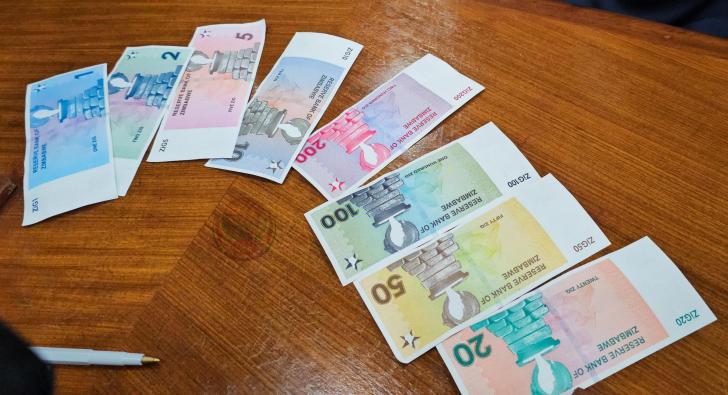News / National
Reserves backing Zimbabwe's ZiG shoot to US$370 million
07 Jul 2024 at 05:34hrs | Views

Prices of goods and services in Zimbabwe are expected to remain stable, thanks to increased cash and mineral reserves backing the new currency, Zimbabwe Gold (ZiG). These reserves have risen from US$285 million to approximately US$370 million over the past three months. This increase provides a robust buffer against external economic forces.
Reserve Bank of Zimbabwe (RBZ) Governor Dr. John Mushayavanhu stated that the central bank has ensured ZiG is fully backed at all times by accumulating reserves from royalties of gold and other precious minerals like diamonds, lithium, and platinum. This effort has led to a significant increase in reserves, supporting the stability of the ZiG currency.
The removal of a 15% value-added tax on gold deliveries has also boosted gold deliveries to Fidelity Gold Refinery, particularly from small-scale miners. The improved reserves are expected to provide a buffer against exchange rate volatility and build the necessary import cover for a sustainable currency.
The RBZ has released adequate liquidity into the market, distributing optimal ZiG notes and coins to banks and ensuring access to small denominations at cash kiosks in high-concentration areas. Dr. Mushayavanhu reported that the ZiG has performed exceptionally well since its introduction on April 5, 2024, with the exchange rate remaining stable between ZiG13.2 and ZiG13.7 per US$1.
Inflation pressures have been subdued, with month-on-month inflation at -2.4% in May and zero percent in June 2024. The stability and predictability of ZiG have led to its acceptance in neighboring countries, similar to the Botswana pula and South African rand in Zimbabwean border towns.
The International Monetary Fund (IMF) praised Zimbabwe for ending a period of macroeconomic instability in early 2024 and noted the stability of the ZiG exchange rate. The IMF recommended stabilizing the ZiG nominal exchange rate against a basket of currencies to achieve price stability.
President Mnangagwa announced plans to gradually de-dollarize the economy following the introduction of ZiG. He suggested that within two years, the ZiG would become the sole currency used in the country, replacing the US dollar.
The World Bank has assigned an international currency code to ZiG, represented as ZWG with the numeric code 924, replacing the previous ZWL and 932 codes. This standard provides unique identification for ZiG in international foreign exchange, banking, payments, and other systems. The new currency notes and coins will continue to be referred to as ZiG.
Reserve Bank of Zimbabwe (RBZ) Governor Dr. John Mushayavanhu stated that the central bank has ensured ZiG is fully backed at all times by accumulating reserves from royalties of gold and other precious minerals like diamonds, lithium, and platinum. This effort has led to a significant increase in reserves, supporting the stability of the ZiG currency.
The removal of a 15% value-added tax on gold deliveries has also boosted gold deliveries to Fidelity Gold Refinery, particularly from small-scale miners. The improved reserves are expected to provide a buffer against exchange rate volatility and build the necessary import cover for a sustainable currency.
The RBZ has released adequate liquidity into the market, distributing optimal ZiG notes and coins to banks and ensuring access to small denominations at cash kiosks in high-concentration areas. Dr. Mushayavanhu reported that the ZiG has performed exceptionally well since its introduction on April 5, 2024, with the exchange rate remaining stable between ZiG13.2 and ZiG13.7 per US$1.
Inflation pressures have been subdued, with month-on-month inflation at -2.4% in May and zero percent in June 2024. The stability and predictability of ZiG have led to its acceptance in neighboring countries, similar to the Botswana pula and South African rand in Zimbabwean border towns.
The International Monetary Fund (IMF) praised Zimbabwe for ending a period of macroeconomic instability in early 2024 and noted the stability of the ZiG exchange rate. The IMF recommended stabilizing the ZiG nominal exchange rate against a basket of currencies to achieve price stability.
President Mnangagwa announced plans to gradually de-dollarize the economy following the introduction of ZiG. He suggested that within two years, the ZiG would become the sole currency used in the country, replacing the US dollar.
The World Bank has assigned an international currency code to ZiG, represented as ZWG with the numeric code 924, replacing the previous ZWL and 932 codes. This standard provides unique identification for ZiG in international foreign exchange, banking, payments, and other systems. The new currency notes and coins will continue to be referred to as ZiG.
Source - The Sunday Mail


































